

Due to the impact of social isolation in the elderly, this is where health-related issues such as depression, cognitive decline and heart disease escalate.
According to Erikson’s 8 stages of psychosocial development, the final stage which is integrity versus despair is when the aging adult individuals evaluate and question their existence. It is often triggered by significant changes in life such as retirement, losing of life partners and friends and facing terminal disease.
Therefore, it is important for individuals and caregivers to understand and minimize social isolation and “despair” among the elderly in the society, we need to address this issue by fostering social inclusion at a larger social level to achieve “integrity” for them to make sense of their lives.
What is social isolation? Written by: No Isolation Last updated: June 5, 2020 Social isolation is a term often used interchangeably with loneliness, but while the two are closely related, they do not necessarily mean the same thing.
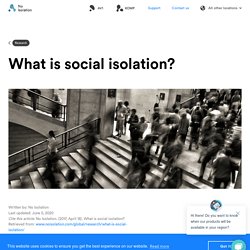
You can be lonely in a crowd, but you will not be socially isolated. Isolation has been defined as an objective state whereby the number of contacts a person has can be counted, whereas loneliness is a subjective experience. While the terms may have slightly different meanings, both can be painful experiences and have a harmful impact on the individual. Social isolation a critical issue facing our elderly. Social isolation among older people is one of the biggest health risks facing Australia.
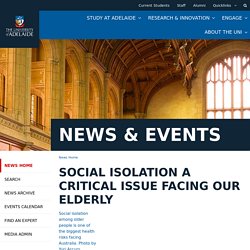
Photo by Yuri Arcurs.Full Image (94.9K) Tuesday, 21 June 2011. Social Isolation And Loneliness Among Elderly - 1380 Words. Social Isolation and Loneliness among elderly Howetta Queenborrows Introduction to Gerontology Professor: Alda Tee October 27th, 2014 As we get older, our social connections often gets smaller, only having things or people that are extremely important to us.
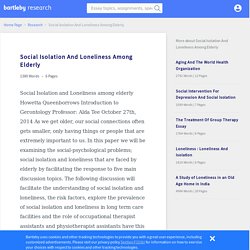
In this paper we will be examining the social-psychological problems; social isolation and loneliness that are faced by elderly by facilitating the response to five main discussion topics. Understanding loneliness and social isolation. Learn about Emotional and Social Isolation, Treatment for Isolation. Isolation is the experience of being separated from others.
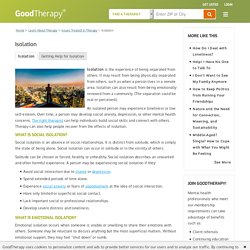
It may result from being physically separated from others, such as when a person lives in a remote area. Isolation can also result from being emotionally removed from a community. (The separation could be real or perceived.) An isolated person may experience loneliness or low self-esteem. Erikson: Integrity vs. Despair.
How do people cope with old age?

According to Erikson, the last psychosocial stage is Integrity vs. Despair. This stage includes, “a retrospective accounting of one’s life to date; how much one embraces life as having been well lived, as opposed to regretting missed opportunities,” (Erikson, 1982, p. 112). Those in late adulthood need to achieve both the acceptance of their life and the inevitability of their death (Barker, 2016). This stage includes finding meaning in one’s life and accepting one’s accomplishments, but also acknowledging what in life has not gone as hoped. Erikson’s theory was the first to propose a lifespan approach to development, and it has encouraged the belief that older adults still have developmental needs. Staying Active: Many older adults want to remain active and work toward replacing opportunities lost with new ones. Integrity vs. Despair in Psychosocial Development. Integrity versus despair is the eighth and final stage of Erik Erikson’s stage theory of psychosocial development.
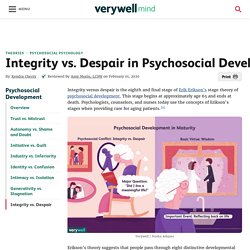
This stage begins at approximately age 65 and ends at death. Psychologists, counselors, and nurses today use the concepts of Erikson's stages when providing care for aging patients.1 Erikson’s theory suggests that people pass through eight distinctive developmental stages as they grow and change through life. While many developmental theories tend to focus purely on childhood events, Erikson was one of the few theorists to look at development across the entire course of the lifespan. He was also one of the first to view the aging process itself as part of human development.
At each stage of psychosocial development, people are faced with a crisis that acts as a turning point in development. Ego Integrity vs. Despair. Causes of Social Isolation in Elderly Adults. No one likes to feel lonely or isolated, but for many seniors, it’s a feeling they know all too well.
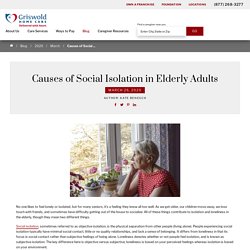
Elderly Loneliness and Its 4 Causes and Effects - Learning Mind. Loneliness can affect people at any stage of their lives.
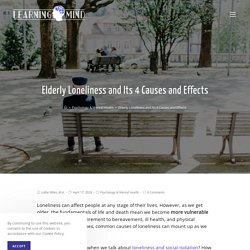
However, as we get older, the fundamentals of life and death mean we become more vulnerable to loneliness. From retirement to bereavement, ill health, and physical distance from loved ones, common causes of loneliness can mount up as we age. But what do we mean when we talk about loneliness and social isolation? Social Isolation: Symptoms, Prevention, Treatments.
To evaluate whether someone is socially isolated and, if so, provide resources to combat it, AARP Foundation joined with the Gerontological Society of America, Give an Hour, the National Association of Area Agencies on Aging, and UnitedHealth Group to create connect2affect.
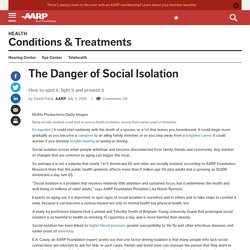
This online tool provides 12 "yes" or "no" questions to determine if a person is at high, medium or low risk for isolation. Questions deal with issues such as how much contact the person has with others each week; whether they have access to transportation; and how much companionship they have. For those shown at risk of isolation, connect2affect offers suggestions for getting reconnected to the outside world. The searchable directory provides local access to rides, activities at senior or community centers, and volunteering opportunities. Experts say senior and community centers can play a very useful role in building healthy connections. “People come for the activities, and they develop friendships,” Carr says. Signs and Symptoms of Chronic Loneliness. Short-term bouts of loneliness can occur to many people at some point in their lives.
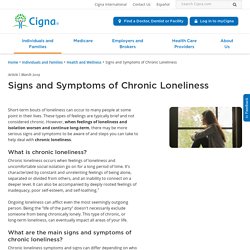
These types of feelings are typically brief and not considered chronic. Health Effects of Social Isolation and Loneliness – Aging Life Care Association™ Clifford Singer, MD Adjunct Professor, University of Maine Chief, Geriatric Mental Health and Neuropsychiatry Acadia Hospital and Eastern Maine Medical Center 268 Stillwater Avenue Bangor Maine 04402 207.973.6179 csinger@emhs.org Cliff Singer is a geriatrician and psychiatrist.
Social isolation, loneliness in older people pose health risks. Human beings are social creatures. Our connection to others enables us to survive and thrive. Yet, as we age, many of us are alone more often than when we were younger, leaving us vulnerable to social isolation and loneliness—and related health problems such as cognitive decline, depression, and heart disease. Fortunately, there are ways to counteract these negative effects. Loneliness tied to a higher risk of dementia. Recent research into older adults confirms that loneliness is tied to a raised risk of developing dementia. The study also reveals that the effect ranges across a diversity of people and is independent of how much social contact they have. Scientists from Florida State University (FSU) in Tallahassee used data on 12,030 individuals from the Health and Retirement Study, a United States government-sponsored longitudinal survey of a nationally representative sample of people aged 50 and older.
They report their findings in a paper that now features in The Journals of Gerontology: Series B. “We are not the first people,” says first study author Dr. Angelina Sutin, who is an associate professor in FSU’s College of Medicine, “to show that loneliness is associated with increased risk of dementia.” “But this is by far the largest sample yet, with a long follow-up,” she adds. Social isolation increases death risk in older people. "Social isolation is associated with a higher risk of death in older people regardless of whether they consider themselves lonely," BBC News has reported. Previous research has suggested that people who have limited social contact are at increased risk of death.
Many researchers have suggested that this is possibly due to the emotional effects of isolation – that feeling lonely is bad for health. But this new, large UK study implies that the relationship between social isolation, feeling lonely and risk of death is more complex. The researchers looked at whether these factors were linked in a large group of UK adults aged 52 or above. How social distancing may affect mental health. As increasingly stringent measures to keep people apart are put in place to slow the spread of the coronavirus, mental health experts are warning that losing everyday social connections comes with psychological costs. And those costs could go up the longer such measures drag on. In response to the accelerating pandemic, a growing number of states have banned all nonessential activities and asked residents to stay home.
Across the country, colleges and offices have gone entirely online, schools and restaurants are closed and nursing homes are barring visitors. Such social distancing can stop, or at least slow, the spread of COVID-19, the disease caused by the new coronavirus (SN: 3/13/20). Isolation and mental health: Signs, impact, and how to cope. Loneliness and Social Isolation Linked to Serious Health Conditions. Social isolation and the elderly poor in Singapore.
SINGAPORE: Her one-room flat was a cluttered mess, and Madam Helen Fernandez herself never seemed to bathe, said her neighbours who always saw her in the same set of clothes. When case workers first visited the unkempt and confused elderly widow, they had to rush her to hospital for very high blood pressure – which resulted because she hadn’t been taking her medication and had been missing doctors’ appointments. Since her husband died 17 years ago, Mdm Fernandez had been living alone with no friends or family – and slowly falling prey to loneliness and dementia. There were times when she’d even call up the police just to talk. Is Isolation Killing America’s Nursing Home Residents? But without communal meals and group activities, Richard has lost those connections. “I noticed before lockdown that his roommate always kept the curtain in the middle of the room closed – the blinds, too,” she adds. “He actually asked me [one] day, ‘Is it nighttime?’ Real Life Case Studies - Contented Dementia Trust.
The SPECAL approach has transformed the lives of the many people we have worked with. Listen to Deborah, June and Pippa as they describe how they used the SPECAL method in caring for their loved ones. Tackling America’s Loneliness Epidemic. Physical activity interventions for treatment of social isolation, loneliness or low social support in older adults: A systematic review and meta-analysis of randomised controlled trials.
Social Isolation - How to Help Patients be Less Lonely ... Isolation Treatments - RightDiagnosis.com. Social needs of older people: a systematic literature review. Crossref Citations. IBM BrandVoice: Technology Can Help The Lonely Elderly Endure Social Distancing. As the COVID-19 pandemic continues to sweep through nations, with no vaccine yet available, a cohesive effort to “flatten the curve” through physical isolation has become a critically important tactic to slow the transmission rate. Solving Loneliness Among Seniors. Preventing Elderly Isolation. 4 Ways to Alleviate Senior Loneliness and Depression. The Importance of Caregivers. Top 11 Caregiver Duties To Know.
Caregiving for Family and Friends — A Public Health Issue. 9 Caregiver Support Groups that Help Caregivers in Need. Virtual Caregiver Support Group - The Life Raft Group. 23 Popular Online And In-Person Caregiver Support Groups. 13 Best Online Support Groups - Virtual Support Groups for Anxiety, Depression, and More.